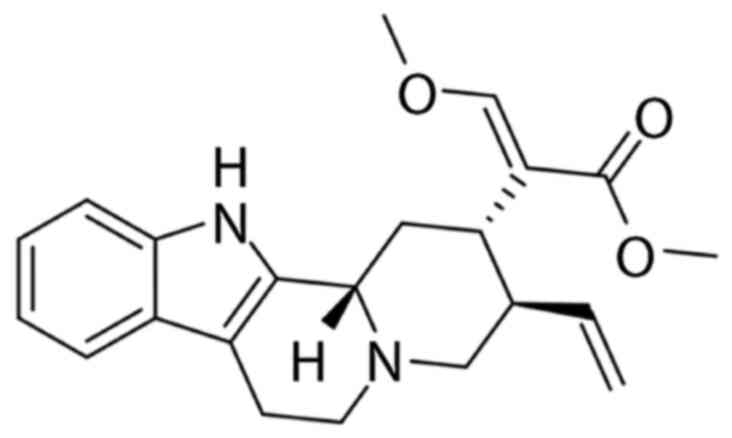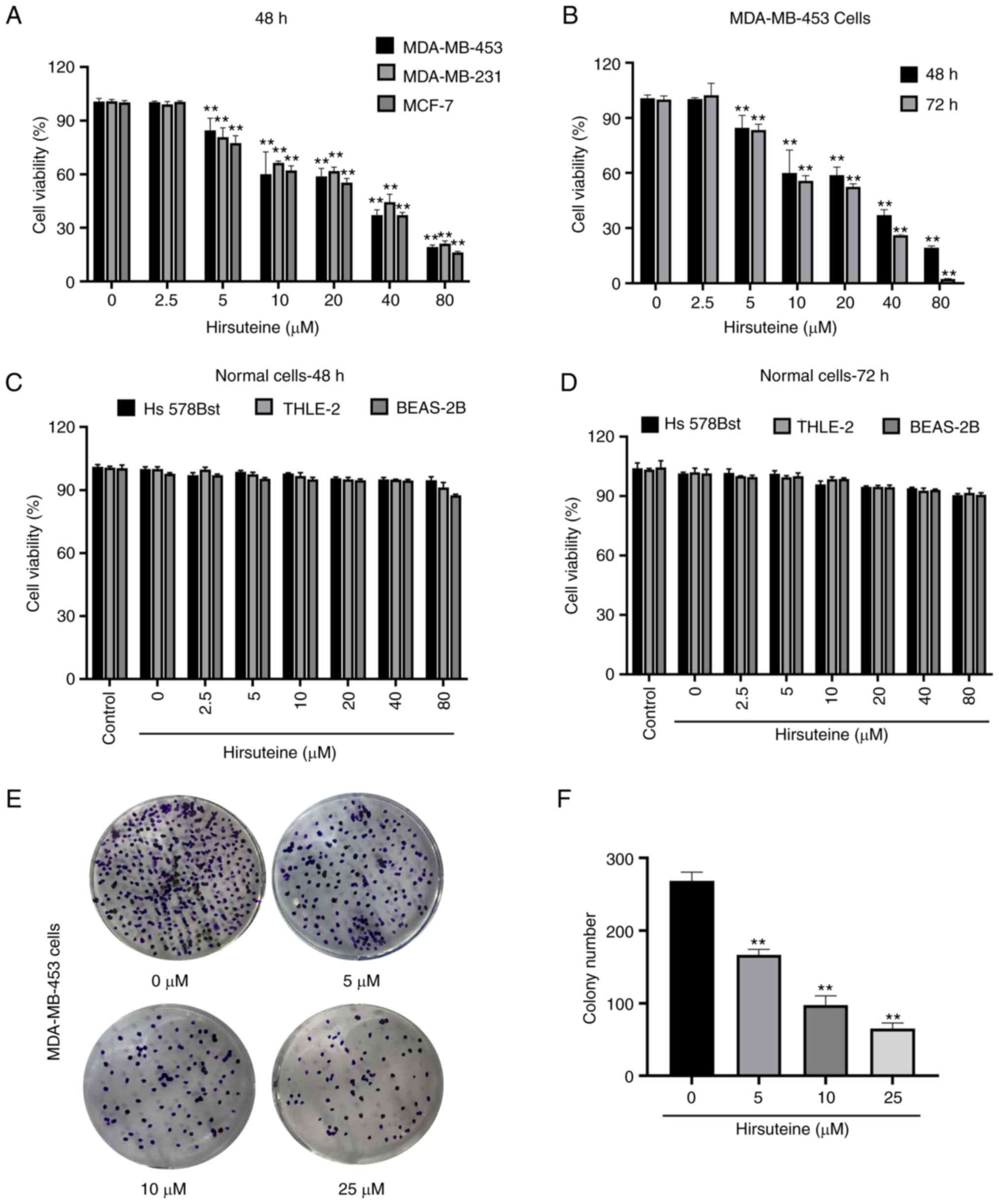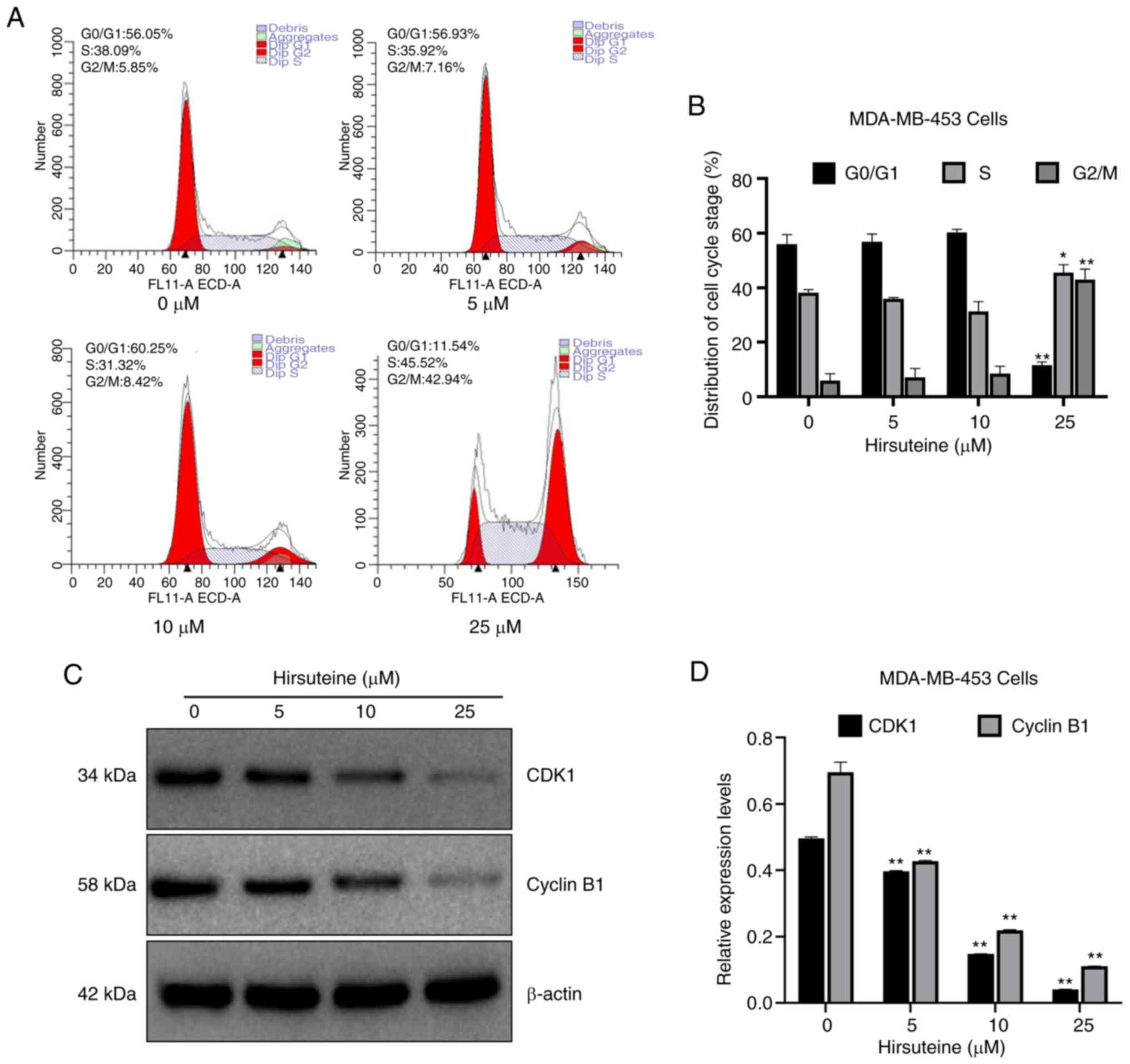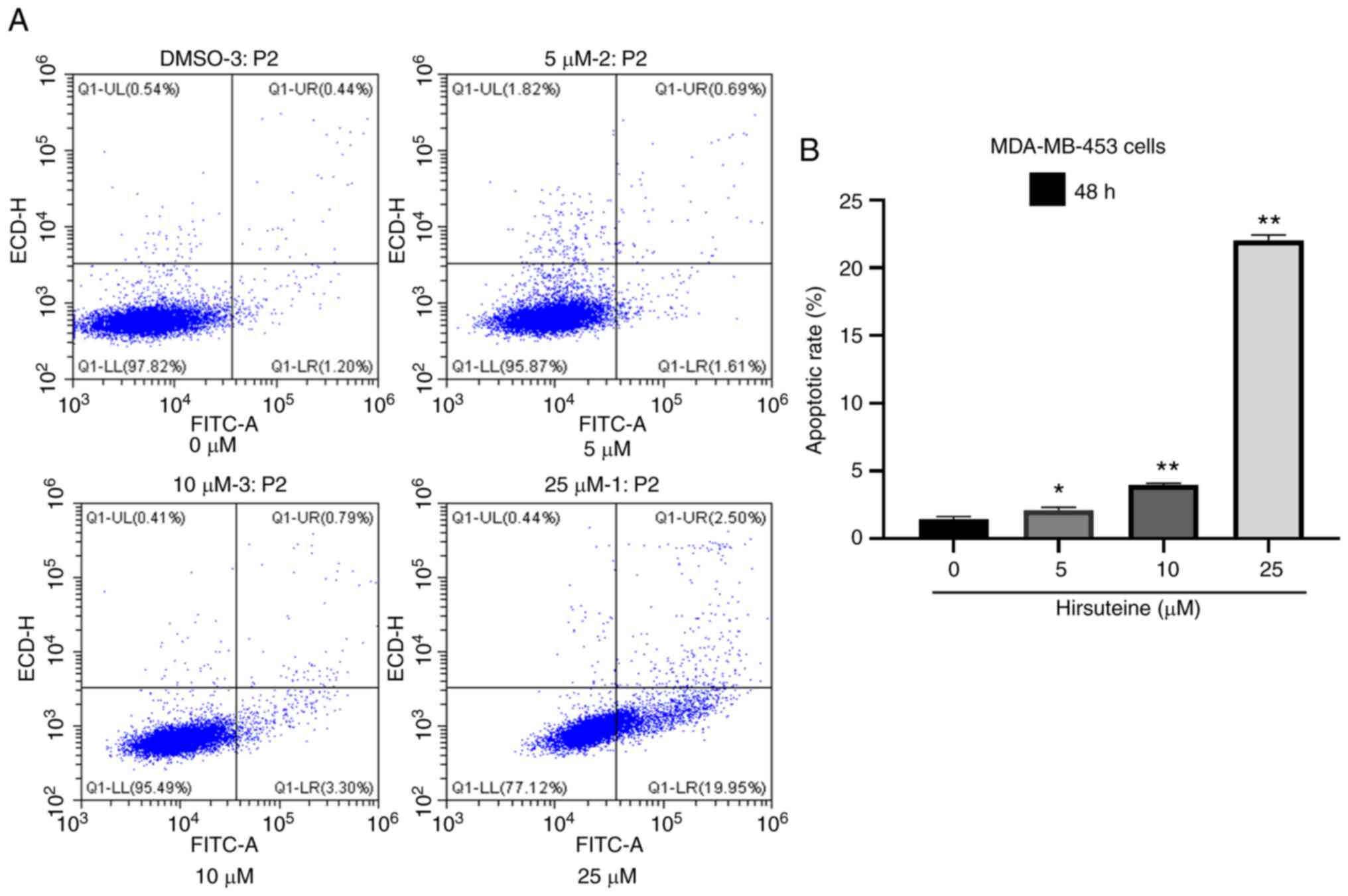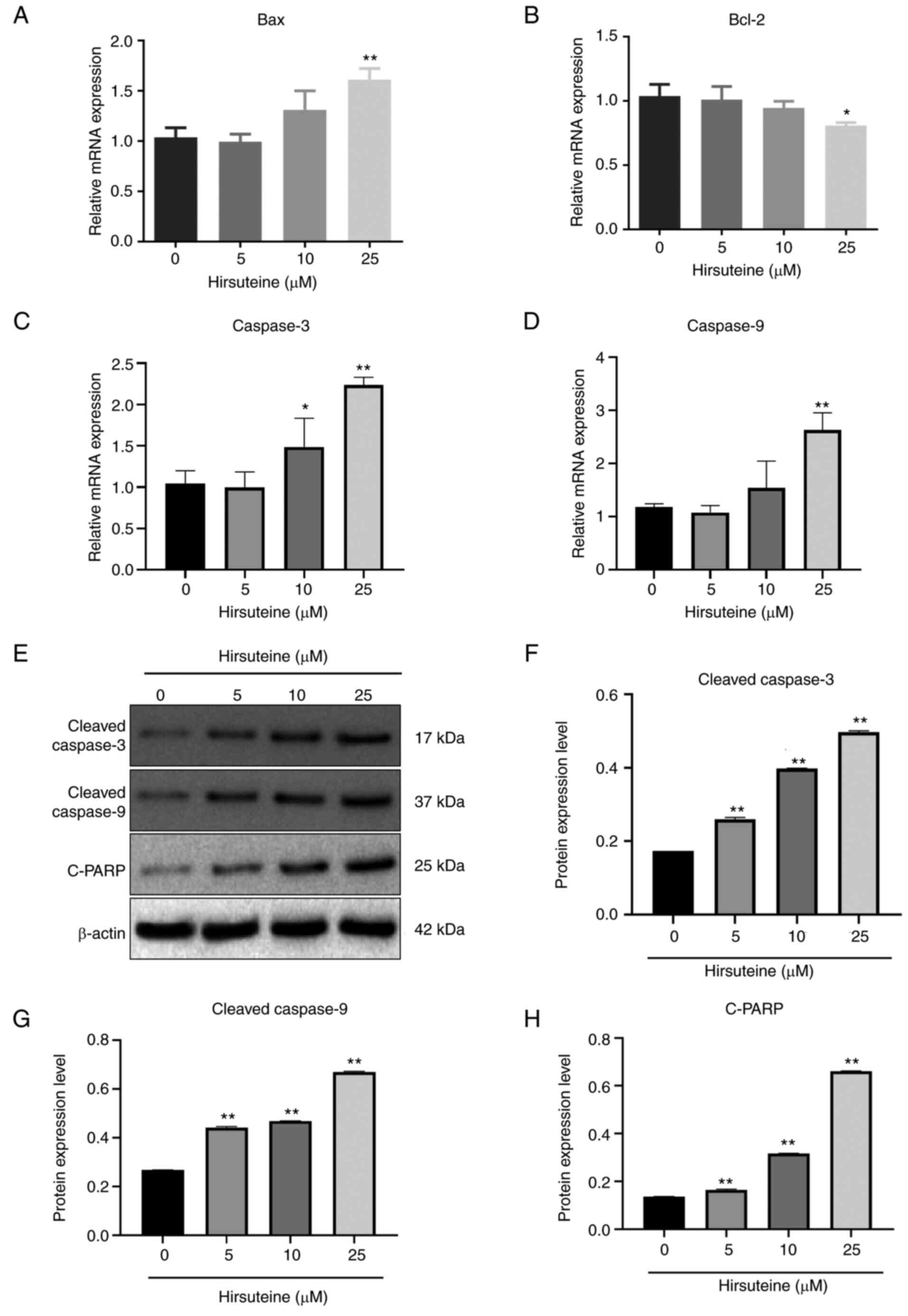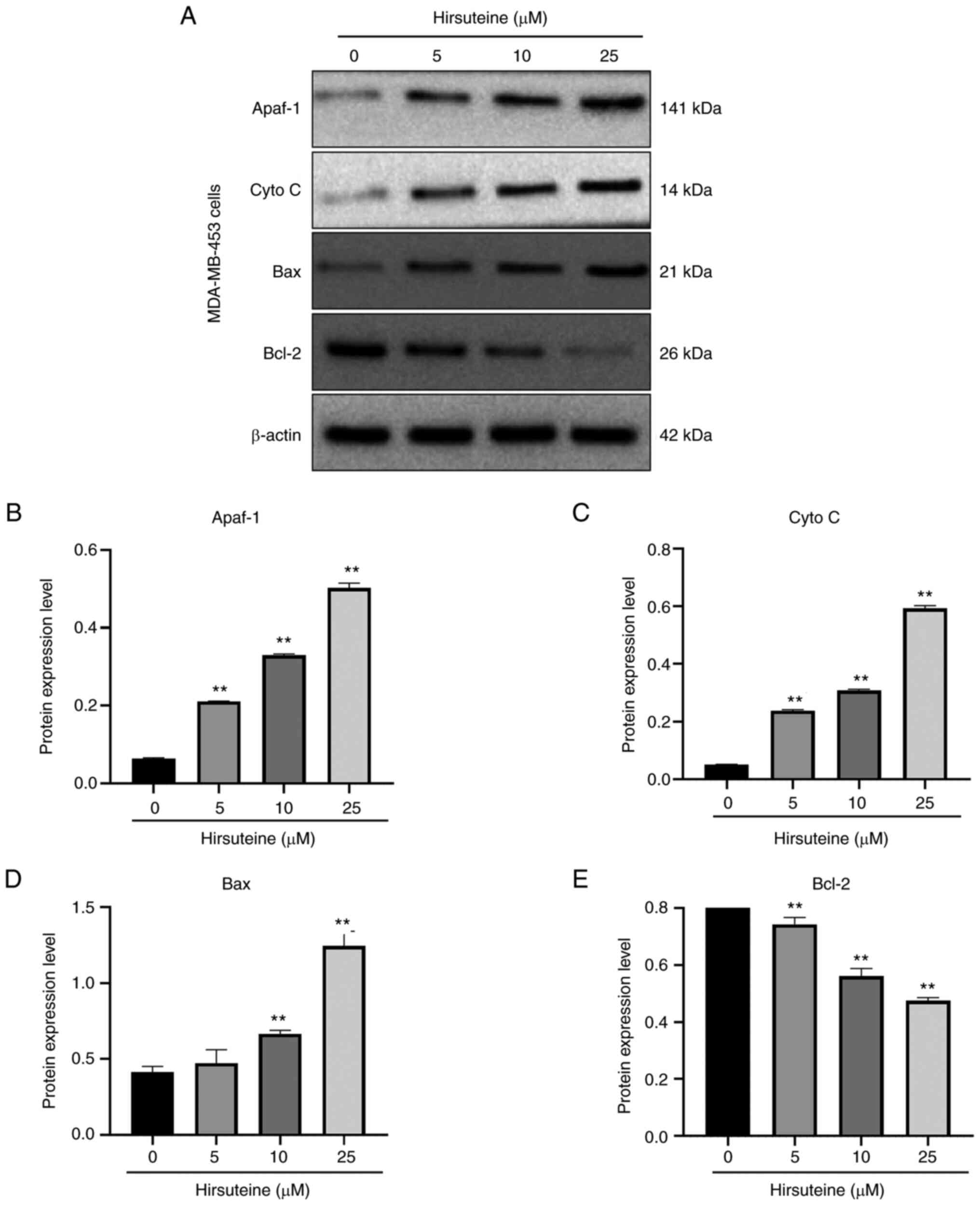|
1
|
Sung H, Ferlay J, Siegel RL, Laversanne M,
Soerjomataram I, Jemal A and Bray F: Global cancer statistics 2020:
GLOBOCAN estimates of incidence and mortality worldwide for 36
cancers in 185 countries. CA Cancer J Clin. 71:209–249. 2021.
View Article : Google Scholar : PubMed/NCBI
|
|
2
|
Kennecke H, Yerushalmi R, Woods R, Cheang
MC, Voduc D, Speers CH, Nielsen TO and Gelmon K: Metastatic
behavior of breast cancer subtypes. J Clin Oncol. 28:3271–3277.
2010. View Article : Google Scholar : PubMed/NCBI
|
|
3
|
Eckhardt BL, Francis PA, Parker BS and
Anderson RL: Strategies for the discovery and development of
therapies for metastatic breast cancer. Nat Rev Drug Discov.
11:479–497. 2012. View
Article : Google Scholar : PubMed/NCBI
|
|
4
|
Redig AJ and McAllister SS: Breast cancer
as a systemic disease: A view of metastasis. J Intern Med.
274:113–126. 2013. View Article : Google Scholar : PubMed/NCBI
|
|
5
|
Perou CM, Sorlie T, Eisen MB, van de Rijn
M, Jeffrey SS, Rees CA, Pollack JR, Ross DT, Johnsen H, Akslen LA,
et al: Molecular portraits of human breast tumours. Nature.
406:747–752. 2000. View
Article : Google Scholar : PubMed/NCBI
|
|
6
|
Tinoco G, Warsch S, Gluck S, Avancha K and
Montero AJ: Treating breast cancer in the 21st century: Emerging
biological therapies. J Cancer. 4:117–132. 2013. View Article : Google Scholar : PubMed/NCBI
|
|
7
|
Pinto AC, Ades F, de Azambuja E and
Piccart-Gebhart M: Trastuzumab for patients with HER2 positive
breast cancer: Delivery, duration and combination therapies.
Breast. 22 (Suppl 2):S152–S155. 2013. View Article : Google Scholar : PubMed/NCBI
|
|
8
|
Bardia A, Hurvitz SA, Tolaney SM, Loirat
D, Punie K, Oliveira M, Brufsky A, Sardesai SD, Kalinsky K, Zelnak
AB, et al: Sacituzumab govitecan in metastatic triple-negative
breast cancer. N Engl J Med. 384:1529–1541. 2021. View Article : Google Scholar : PubMed/NCBI
|
|
9
|
Dean AQ, Luo S, Twomey JD and Zhang B:
Targeting cancer with antibody-drug conjugates: Promises and
challenges. MAbs. 13:19514272021. View Article : Google Scholar : PubMed/NCBI
|
|
10
|
Zaman S, Jadid H, Denson AC and Gray JE:
Targeting Trop-2 in solid tumors: Future prospects. Onco Targets
Ther. 12:1781–1790. 2019. View Article : Google Scholar : PubMed/NCBI
|
|
11
|
Syed YY: Sacituzumab govitecan: First
approval. Drugs. 80:1019–1025. 2020. View Article : Google Scholar : PubMed/NCBI
|
|
12
|
O'Leary B, Finn RS and Turner NC: Treating
cancer with selective CDK4/6 inhibitors. Nat Rev Clin Oncol.
13:417–430. 2016. View Article : Google Scholar : PubMed/NCBI
|
|
13
|
Piezzo M, Cocco S, Caputo R, Cianniello D,
Gioia GD, Lauro VD, Fusco G, Martinelli C, Nuzzo F, Pensabene M and
Laurentiis MD: Targeting cell cycle in breast cancer: CDK4/6
Inhibitors. Int J Mol Sci. 21:64792020. View Article : Google Scholar : PubMed/NCBI
|
|
14
|
Spring LM, Wander SA, Zangardi M and
Bardia A: CDK 4/6 inhibitors in breast cancer: Current
controversies and future directions. Curr Oncol Rep. 21:252019.
View Article : Google Scholar : PubMed/NCBI
|
|
15
|
Spring LM, Wander SA, Andre F, Moy B,
Turner NC and Bardia A: Cyclin-dependent kinase 4 and 6 inhibitors
for hormone receptor-positive breast cancer: Past, present, and
future. Lancet. 395:817–827. 2020. View Article : Google Scholar : PubMed/NCBI
|
|
16
|
Finn RS, Crown JP, Lang I, Boer K,
Bondarenko IM, Kulyk SO, Ettl J, Patel R, Pinter T, Schmidt M, et
al: The cyclin-dependent kinase 4/6 inhibitor palbociclib in
combination with letrozole versus letrozole alone as first-line
treatment of oestrogen receptor-positive, HER2-negative, advanced
breast cancer (PALOMA-1/TRIO-18): A randomised phase 2 study.
Lancet Oncol. 16:25–35. 2015. View Article : Google Scholar : PubMed/NCBI
|
|
17
|
Corona SP and Generali D: Abemaciclib: A
CDK4/6 inhibitor for the treatment of
HR+/HER2− advanced breast cancer. Drug Des
Devel Ther. 12:321–330. 2018. View Article : Google Scholar : PubMed/NCBI
|
|
18
|
Johnston SRD, Harbeck N, Hegg R, Toi M,
Martin M, Shao ZM, Zhang QY, Rodriguez JLM, Campone M, Hamilton E,
et al: Abemaciclib combined with endocrine therapy for the adjuvant
treatment of HR+, HER2-, node-positive, high-risk, early breast
cancer (monarchE). J Clin Oncol. 38:3987–3998. 2020. View Article : Google Scholar : PubMed/NCBI
|
|
19
|
Richardson JL, Marks G and Levine A: The
influence of symptoms of disease and side effects of treatment on
compliance with cancer therapy. J Clin Oncol. 6:1746–1752. 1988.
View Article : Google Scholar : PubMed/NCBI
|
|
20
|
Coates A, Abraham S, Kaye SB, Sowerbutts
T, Frewin C, Fox RM and Tattersall MH: On the receiving end-patient
perception of the side-effects of cancer chemotherapy. Eur J Cancer
Clin Oncol. 19:203–208. 1983. View Article : Google Scholar : PubMed/NCBI
|
|
21
|
Chirumbolo S: Plant phytochemicals as new
potential drugs for immune disorders and cancer therapy: Really a
promising path? J Sci Food Agric. 92:1573–1577. 2012. View Article : Google Scholar : PubMed/NCBI
|
|
22
|
Thakur VS, Deb G, Babcook MA and Gupta S:
Plant phytochemicals as epigenetic modulators: Role in cancer
chemoprevention. AAPS J. 16:151–163. 2014. View Article : Google Scholar : PubMed/NCBI
|
|
23
|
Zhang YJ, Gan RY, Li S, Zhou Y, Li AN, Xu
DP and Li HB: Antioxidant phytochemicals for the prevention and
treatment of chronic diseases. Molecules. 20:21138–21156. 2015.
View Article : Google Scholar : PubMed/NCBI
|
|
24
|
Howes MJ and Simmonds MS: The role of
phytochemicals as micronutrients in health and disease. Curr Opin
Clin Nutr Metab Care. 17:558–566. 2014. View Article : Google Scholar : PubMed/NCBI
|
|
25
|
Li Z, Feiyue Z and Gaofeng L: Traditional
chinese medicine and lung cancer-from theory to practice. Biomed
Pharmacother. 137:1113812021. View Article : Google Scholar : PubMed/NCBI
|
|
26
|
Li S, Wu Z and Le W: Traditional chinese
medicine for dementia. Alzheimers Dement. 17:1066–1071. 2021.
View Article : Google Scholar : PubMed/NCBI
|
|
27
|
Koehn FE and Carter GT: The evolving role
of natural products in drug discovery. Nat Rev Drug Discov.
4:206–220. 2005. View
Article : Google Scholar : PubMed/NCBI
|
|
28
|
Ndagijimana A, Wang X, Pan G, Zhang F,
Feng H and Olaleye O: A review on indole alkaloids isolated from
Uncaria rhynchophylla and their pharmacological studies.
Fitoterapia. 86:35–47. 2013. View Article : Google Scholar : PubMed/NCBI
|
|
29
|
Nakazawa T, Banba K, Hata K, Nihei Y,
Hoshikawa A and Ohsawa K: Metabolites of hirsuteine and hirsutine,
the major indole alkaloids of Uncaria rhynchophylla, in rats. Biol
Pharm Bull. 29:1671–1677. 2006. View Article : Google Scholar : PubMed/NCBI
|
|
30
|
Horie S, Yano S, Aimi N, Sakai S and
Watanabe K: Effects of hirsutine, an antihypertensive indole
alkaloid from Uncaria rhynchophylla, on intracellular calcium in
rat thoracic aorta. Life Sci. 50:491–498. 1992. View Article : Google Scholar : PubMed/NCBI
|
|
31
|
Reed JC: Dysregulation of apoptosis in
cancer. J Clin Oncol. 17:2941–2953. 1999. View Article : Google Scholar : PubMed/NCBI
|
|
32
|
Sola S, Morgado AL and Rodrigues CM: Death
receptors and mitochondria: Two prime triggers of neural apoptosis
and differentiation. Biochim Biophys Acta. 1830:2160–2166. 2013.
View Article : Google Scholar : PubMed/NCBI
|
|
33
|
Isabelle M, Moreel X, Gagne JP, Rouleau M,
Ethier C, Gagne P, Hendzel MJ and Poirier GG: Investigation of
PARP-1, PARP-2, and PARG interactomes by affinity-purification mass
spectrometry. Proteome Sci. 8:222010. View Article : Google Scholar : PubMed/NCBI
|
|
34
|
Fulda S and Debatin KM: Extrinsic versus
intrinsic apoptosis pathways in anticancer chemotherapy. Oncogene.
25:4798–4811. 2006. View Article : Google Scholar : PubMed/NCBI
|
|
35
|
Debatin KM: Apoptosis pathways in cancer
and cancer therapy. Cancer Immunol Immunother. 53:153–159. 2004.
View Article : Google Scholar : PubMed/NCBI
|
|
36
|
Gao S, Guo T, Luo S, Zhang Y, Ren Z, Lang
X, Hu G, Zuo D, Jia W, Kong D, et al: Growth inhibitory and
pro-apoptotic effects of hirsuteine in chronic myeloid leukemia
cells through targeting sphingosine kinase 1. Biomol Ther (Seoul).
30:553–561. 2022. View Article : Google Scholar : PubMed/NCBI
|
|
37
|
Huang BY, Zeng Y, Li YJ, Huang XJ, Hu N,
Yao N, Chen MF, Yang ZG, Chen ZS, Zhang DM and Zeng CQ: Uncaria
alkaloids reverse ABCB1-mediated cancer multidrug resistance. Int J
Oncol. 51:257–268. 2017. View Article : Google Scholar : PubMed/NCBI
|
|
38
|
Meng J, Su R, Wang L, Yuan B and Li L:
Inhibitory effect and mechanism of action (MOA) of hirsutine on the
proliferation of T-cell leukemia Jurkat clone E6-1 cells. PeerJ.
9:e106922021. View Article : Google Scholar : PubMed/NCBI
|
|
39
|
Livak KJ and Schmittgen TD: Analysis of
relative gene expression data using real-time quantitative PCR and
the 2(−Delta Delta C(T)) method. Methods. 25:402–408. 2001.
View Article : Google Scholar : PubMed/NCBI
|
|
40
|
Otsuki L and Brand AH: Cell cycle
heterogeneity directs the timing of neural stem cell activation
from quiescence. Science. 360:99–102. 2018. View Article : Google Scholar : PubMed/NCBI
|
|
41
|
Poncelet L, Garigliany M, Ando K, Franssen
M, Desmecht D and Brion JP: Cell cycle S phase markers are
expressed in cerebral neuron nuclei of cats infected by the Feline
Panleukopenia virus. Cell Cycle. 15:3482–3489. 2016. View Article : Google Scholar : PubMed/NCBI
|
|
42
|
Yamada T, Das Gupta TK and Beattie CW:
p28-mediated activation of p53 in G2-M phase of the cell cycle
enhances the efficacy of DNA damaging and antimitotic chemotherapy.
Cancer Res. 76:2354–2365. 2016. View Article : Google Scholar : PubMed/NCBI
|
|
43
|
Handrick R, Ganswindt U, Faltin H, Goecke
B, Daniel PT, Budach W, Belka C and Jendrossek V: Combined action
of celecoxib and ionizing radiation in prostate cancer cells is
independent of pro-apoptotic Bax. Radiother Oncol. 90:413–421.
2009. View Article : Google Scholar : PubMed/NCBI
|
|
44
|
Odle TG: Adverse effects of breast cancer
treatment. Radiol Technol. 85:297M–319M. 2014.PubMed/NCBI
|
|
45
|
Chopra D, Rehan HS, Sharma V and Mishra R:
Chemotherapy-induced adverse drug reactions in oncology patients: A
prospective observational survey. Indian J Med Paediatr Oncol.
37:42–46. 2016. View Article : Google Scholar : PubMed/NCBI
|
|
46
|
Mina LA, Lim S, Bahadur SW and Firoz AT:
Immunotherapy for the treatment of breast cancer: Emerging new
data. Breast Cancer (Dove Med Press). 11:321–328. 2019.PubMed/NCBI
|
|
47
|
Brahmer JR, Lacchetti C, Schneider BJ,
Atkins MB, Brassil KJ, Caterino JM, Chau I, Ernstoff MS, Gardner
JM, Ginex P, et al: Management of immune-related adverse events in
patients treated with immune checkpoint inhibitor therapy: American
society of clinical oncology clinical practice guideline. J Clin
Oncol. 36:1714–1768. 2018. View Article : Google Scholar : PubMed/NCBI
|
|
48
|
Yang W, Ip SP, Liu L, Xian YF and Lin ZX:
Uncaria rhynchophylla and its major constituents on central nervous
system: A review on their pharmacological actions. Curr Vasc
Pharmacol. 18:346–357. 2020. View Article : Google Scholar : PubMed/NCBI
|
|
49
|
Lee J, Son D, Lee P, Kim SY, Kim H, Kim CJ
and Lim E: Alkaloid fraction of Uncaria rhynchophylla protects
against N-methyl-D-aspartate-induced apoptosis in rat hippocampal
slices. Neurosci Lett. 348:51–55. 2003. View Article : Google Scholar : PubMed/NCBI
|
|
50
|
Chen XX, Leung GP, Zhang ZJ, Xiao JB, Lao
LX, Feng F, Mak JCW, Wang Y, Sze SCW and Zhang KYB:
Proanthocyanidins from Uncaria rhynchophylla induced apoptosis in
MDA-MB-231 breast cancer cells while enhancing cytotoxic effects of
5-fluorouracil. Food Chem Toxicol. 107:248–260. 2017. View Article : Google Scholar : PubMed/NCBI
|
|
51
|
Lee JS, Kim J, Kim BY, Lee HS, Ahn JS and
Chang YS: Inhibition of phospholipase cgamma1 and cancer cell
proliferation by triterpene esters from Uncaria rhynchophylla. J
Nat Prod. 63:753–756. 2000. View Article : Google Scholar : PubMed/NCBI
|
|
52
|
Zhang R, Li G, Zhang Q, Tang Q, Huang J,
Hu C, Liu Y, Wang Q, Liu W, Gao N and Zhou S: Hirsutine induces
mPTP-dependent apoptosis through ROCK1/PTEN/PI3K/GSK3β pathway in
human lung cancer cells. Cell Death Dis. 9:5982018. View Article : Google Scholar : PubMed/NCBI
|
|
53
|
Molinari M: Cell cycle checkpoints and
their inactivation in human cancer. Cell Prolif. 33:261–274. 2000.
View Article : Google Scholar : PubMed/NCBI
|
|
54
|
Wu G, Chen G, Zhou J, Zhu H, Chu J and
Zhang F: Liriodenine enhances radiosensitivity in esophageal cancer
ECA-109 cells by inducing apoptosis and G2/M arrest. Oncol Lett.
16:5020–5026. 2018.PubMed/NCBI
|
|
55
|
Maharjan S, Kwon YS, Lee MG, Lee KS and
Nam KS: Cell cycle arrest-mediated cell death by morin in
MDA-MB-231 triple-negative breast cancer cells. Pharmacol Rep.
73:1315–1327. 2021. View Article : Google Scholar : PubMed/NCBI
|
|
56
|
Han YH, Mun JG, Jeon HD, Kee JY and Hong
SH: Betulin inhibits lung metastasis by inducing cell cycle arrest,
autophagy, and apoptosis of metastatic colorectal cancer cells.
Nutrients. 12:662019. View Article : Google Scholar : PubMed/NCBI
|
|
57
|
Gong D and Ferrell JE Jr: The roles of
cyclin A2, B1, and B2 in early and late mitotic events. Mol Biol
Cell. 21:3149–3161. 2010. View Article : Google Scholar : PubMed/NCBI
|
|
58
|
Kino T, Gragerov A, Valentin A,
Tsopanomihalou M, Ilyina-Gragerova G, Erwin-Cohen R, Chrousos GP
and Pavlakis GN: Vpr protein of human immunodeficiency virus type 1
binds to 14-3-3 proteins and facilitates complex formation with
Cdc25C: Implications for cell cycle arrest. J Virol. 79:2780–2787.
2005. View Article : Google Scholar : PubMed/NCBI
|
|
59
|
Knight GL, Turnell AS and Roberts S: Role
for Wee1 in inhibition of G2-to-M transition through the
cooperation of distinct human papillomavirus type 1 E4 proteins. J
Virol. 80:7416–7426. 2006. View Article : Google Scholar : PubMed/NCBI
|
|
60
|
Jackman M, Lindon C, Nigg EA and Pines J:
Active cyclin B1-Cdk1 first appears on centrosomes in prophase. Nat
Cell Biol. 5:143–148. 2003. View
Article : Google Scholar : PubMed/NCBI
|
|
61
|
Kramer A, Mailand N, Lukas C, Syljuasen
RG, Wilkinson CJ, Nigg EA, Bartek J and Lukas J:
Centrosome-associated Chk1 prevents premature activation of
cyclin-B-Cdk1 kinase. Nat Cell Biol. 6:884–891. 2004. View Article : Google Scholar : PubMed/NCBI
|
|
62
|
Gavet O and Pines J: Progressive
activation of CyclinB1-Cdk1 coordinates entry to mitosis. Dev Cell.
18:533–543. 2010. View Article : Google Scholar : PubMed/NCBI
|
|
63
|
Gavet O and Pines J: Activation of cyclin
B1-Cdk1 synchronizes events in the nucleus and the cytoplasm at
mitosis. J Cell Biol. 189:247–259. 2010. View Article : Google Scholar : PubMed/NCBI
|
|
64
|
Ghobrial IM, Witzig TE and Adjei AA:
Targeting apoptosis pathways in cancer therapy. CA Cancer J Clin.
55:178–194. 2005. View Article : Google Scholar : PubMed/NCBI
|
|
65
|
Strasser A, Harris AW, Jacks T and Cory S:
DNA damage can induce apoptosis in proliferating lymphoid cells via
p53-independent mechanisms inhibitable by Bcl-2. Cell. 79:329–339.
1994. View Article : Google Scholar : PubMed/NCBI
|
|
66
|
Schmitt CA, Rosenthal CT and Lowe SW:
Genetic analysis of chemoresistance in primary murine lymphomas.
Nat Med. 6:1029–1035. 2000. View
Article : Google Scholar : PubMed/NCBI
|
|
67
|
Thornberry NA and Lazebnik Y: Caspases:
Enemies within. Science. 281:1312–1316. 1998. View Article : Google Scholar : PubMed/NCBI
|
|
68
|
Wolf BB and Green DR: Suicidal tendencies:
Apoptotic cell death by caspase family proteinases. J Biol Chem.
274:20049–20052. 1999. View Article : Google Scholar : PubMed/NCBI
|
|
69
|
Pal MK, Jaiswar SP, Srivastav AK, Goyal S,
Dwivedi A, Verma A, Singh J, Pathak AK, Sankhwar PL and Ray RS:
Synergistic effect of piperine and paclitaxel on cell fate via
cyt-c, Bax/Bcl-2-caspase-3 pathway in ovarian adenocarcinomas
SKOV-3 cells. Eur J Pharmacol. 791:751–762. 2016. View Article : Google Scholar : PubMed/NCBI
|
|
70
|
Qu Z, Jiang C, Wu J and Ding Y:
Lenalidomide induces apoptosis and inhibits angiogenesis via
caspase3 and VEGF in hepatocellular carcinoma cells. Mol Med Rep.
14:4781–4786. 2016. View Article : Google Scholar : PubMed/NCBI
|
|
71
|
Hengartner MO: The biochemistry of
apoptosis. Nature. 407:770–776. 2000. View Article : Google Scholar : PubMed/NCBI
|















